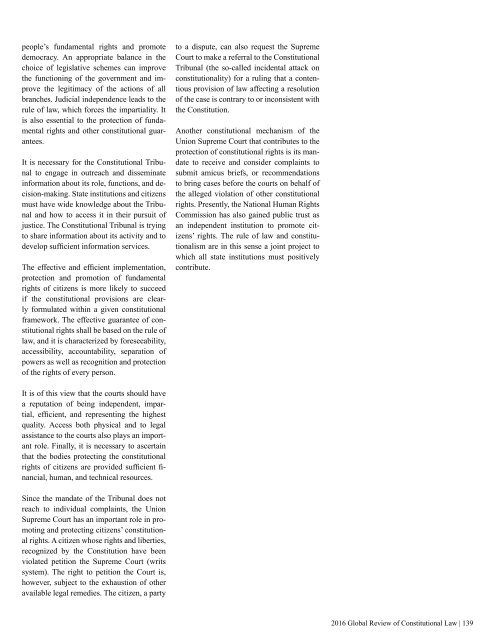2016 Global Review of Constitutional Law
I-CONnect–Clough Center collaboration.
I-CONnect–Clough Center collaboration.
You also want an ePaper? Increase the reach of your titles
YUMPU automatically turns print PDFs into web optimized ePapers that Google loves.
people’s fundamental rights and promote<br />
democracy. An appropriate balance in the<br />
choice <strong>of</strong> legislative schemes can improve<br />
the functioning <strong>of</strong> the government and improve<br />
the legitimacy <strong>of</strong> the actions <strong>of</strong> all<br />
branches. Judicial independence leads to the<br />
rule <strong>of</strong> law, which forces the impartiality. It<br />
is also essential to the protection <strong>of</strong> fundamental<br />
rights and other constitutional guarantees.<br />
It is necessary for the <strong>Constitutional</strong> Tribunal<br />
to engage in outreach and disseminate<br />
information about its role, functions, and decision-making.<br />
State institutions and citizens<br />
must have wide knowledge about the Tribunal<br />
and how to access it in their pursuit <strong>of</strong><br />
justice. The <strong>Constitutional</strong> Tribunal is trying<br />
to share information about its activity and to<br />
develop sufficient information services.<br />
The effective and efficient implementation,<br />
protection and promotion <strong>of</strong> fundamental<br />
rights <strong>of</strong> citizens is more likely to succeed<br />
if the constitutional provisions are clearly<br />
formulated within a given constitutional<br />
framework. The effective guarantee <strong>of</strong> constitutional<br />
rights shall be based on the rule <strong>of</strong><br />
law, and it is characterized by foreseeability,<br />
accessibility, accountability, separation <strong>of</strong><br />
powers as well as recognition and protection<br />
<strong>of</strong> the rights <strong>of</strong> every person.<br />
to a dispute, can also request the Supreme<br />
Court to make a referral to the <strong>Constitutional</strong><br />
Tribunal (the so-called incidental attack on<br />
constitutionality) for a ruling that a contentious<br />
provision <strong>of</strong> law affecting a resolution<br />
<strong>of</strong> the case is contrary to or inconsistent with<br />
the Constitution.<br />
Another constitutional mechanism <strong>of</strong> the<br />
Union Supreme Court that contributes to the<br />
protection <strong>of</strong> constitutional rights is its mandate<br />
to receive and consider complaints to<br />
submit amicus briefs, or recommendations<br />
to bring cases before the courts on behalf <strong>of</strong><br />
the alleged violation <strong>of</strong> other constitutional<br />
rights. Presently, the National Human Rights<br />
Commission has also gained public trust as<br />
an independent institution to promote citizens’<br />
rights. The rule <strong>of</strong> law and constitutionalism<br />
are in this sense a joint project to<br />
which all state institutions must positively<br />
contribute.<br />
It is <strong>of</strong> this view that the courts should have<br />
a reputation <strong>of</strong> being independent, impartial,<br />
efficient, and representing the highest<br />
quality. Access both physical and to legal<br />
assistance to the courts also plays an important<br />
role. Finally, it is necessary to ascertain<br />
that the bodies protecting the constitutional<br />
rights <strong>of</strong> citizens are provided sufficient financial,<br />
human, and technical resources.<br />
Since the mandate <strong>of</strong> the Tribunal does not<br />
reach to individual complaints, the Union<br />
Supreme Court has an important role in promoting<br />
and protecting citizens’ constitutional<br />
rights. A citizen whose rights and liberties,<br />
recognized by the Constitution have been<br />
violated petition the Supreme Court (writs<br />
system). The right to petition the Court is,<br />
however, subject to the exhaustion <strong>of</strong> other<br />
available legal remedies. The citizen, a party<br />
<strong>2016</strong> <strong>Global</strong> <strong>Review</strong> <strong>of</strong> <strong>Constitutional</strong> <strong>Law</strong> | 139


